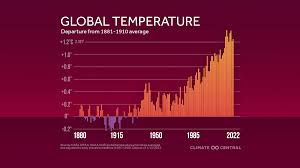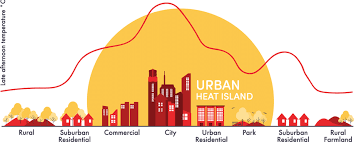Why Heat Waves Are a Hot Topic in 2025i
The summer of 2025 has broken records of hot weather all around the world. In the blazing metropolises of Southern Europe up to the parched deserts of the U.S., the frequency, and severity of heatwaves continue to rise, and researchers concur: this process is not only fueled by climate change, but also by global warming.
So what is really a heat wave? What makes it worse through climate change? And why then do you care?
In this blog, we will examine the increasing relationship between heat waves and climate change, its recent impact on lives and what the world is exhibiting currently, and what individuals, governments and business players may do regarding it.
What Is a Heat Wave?
Heat wave is basically a lengthy span of uncommonly hot climate and is commonly longer than two days and above historical higher levels of a given vicinity.
However, it is not only about heat, it is about duration, intensity and humidity which build to enhance the risk, especially when there are vulnerable people including elderly, children and people with chronic diseases.How Climate Change Fuels Heat Waves
1. Rising Global Temperatures
2. Disruption of Jet Streams
The melting of polar ice caps and warming oceans alter atmospheric jet streams—narrow bands of wind high in the atmosphere. This can cause stagnant high-pressure systems that trap heat over regions for days or weeks.
3. Urban Heat Island Effect
In densely populated areas, concrete, asphalt, and lack of vegetation trap more heat. Combined with global warming, cities are experiencing temperatures several degrees higher than nearby rural areas.
Heat Waves in 2025: Global Highlights
United States:
Major cities like Phoenix, Las Vegas, and Houston recorded multiple consecutive days above 45°C (113°F). Hospitals reported a spike in heat stroke and dehydration cases.
Europe:
Spain, France, and Italy saw temperatures above 44°C, sparking wildfires and energy rationing due to AC usage.
Asia:
India and Pakistan reported deadly heat waves with temperatures exceeding 50°C, affecting agriculture and water availability.
Africa:
North African nations like Algeria and Tunisia faced record-breaking heat, causing power blackouts and water shortages.
Health Impacts of Heat Waves
Heat waves are not just uncomfortable—they are deadly. According to the World Health Organization (WHO), heat waves kill tens of thousands annually.
Common Health Risks:
- Heat stroke and heat exhaustion
- Breathing problems (particularly in polluted places)
- Dehydration causes kidney stress.
- Heightened risk of cardiovascular incidence
- Strain on mental health (irritability, fatigue and sleep disturbances)
Constituting especially those that are at risk are the old, small children, those who work outside, and those who have chronic illnesses.
Environmental and Economic Effects
1. Agricultural Damage
Crops such as wheat, maize, and rice are sensitive to extreme heat, which reduces yields and threatens global food security.
2. Water Shortages
Increased evaporation and drought conditions reduce water supply for drinking, irrigation, and hydropower.
3. Infrastructure Stress
High temperatures warp roads, strain power grids, and overwhelm cooling systems, leading to blackouts and system failures.
4. Wildfires
Heat waves dry vegetation, creating perfect conditions for forest fires, which in turn worsen air pollution and emit more carbon dioxide.
What Can We Do About It?
1. Reduce Greenhouse Gas Emissions
Switch to renewable energy, support sustainable transport, and reduce personal carbon footprints.
2. Design Heat-Resilient Cities
Cities must invest in green infrastructure like trees, reflective rooftops, and shaded public spaces to cool down urban zones.
3. Protect Public Health
Governments should develop heatwave response plans, improve early warning systems, and open cooling centers in vulnerable communities.
4. Conserve Water
During extreme heat, conserve water by fixing leaks, using water-efficient appliances, and avoiding unnecessary outdoor watering.
5. Raise Awareness
Educating communities about how to stay cool and hydrated can save lives during peak heat waves.
What Experts Say
What you are trying to say here is that the ice is becoming less and less stable, and this will continue to melt the ice very rapidly, correct? Dr. Fatima Rehman, Climate Scientist, UN Environment Programme
It is no longer a threat that can occur in the future. The alarming heat waves are here already, and they are getting worse.
-- John Avery, Global Climate Observatory, Director
Quick Tips to Stay Safe During Heat Waves
- Consume lots of cool water (no alcohol & caffeine)
- Indoors at times when it is the hottest (11am- 4pm)
- Take fans or use air conditioner or go to an air-conditioned area
- Wear loose clothing, loose-fitting clotheswear
- Monitor pets, elderly and neighbors
- No leaving of children or pets inside hot cars
Heat Wave Fast Facts
| Statistic | Details |
|---|---|
| Global heat-related deaths (2024) | Over 61,000 |
| Expected heatwave days/year by 2050 | +300% increase |
| Countries most at risk | India, Pakistan, USA, Spain, Nigeria |
| Safe indoor temp during a heat wave | 24°C (75°F) or lower |
| WHO recommended hydration | 2.5–3L/day during extreme heat |
It’s Time to Act
Heat waves are not longer seasonal spoilers any more. They are indicators of the fast-shifting kind of climate with dangerous health-related, economic, and ecological repercussions.
Individual responsibility and the impetus of systems-level change can allow decreasing warming in the future and preserving the lives of vulnerable people.
Change starts at the local level to solve the global climate change.























0 Comments
At The Hot News Press, Your idea matters to us. Keep in touch.